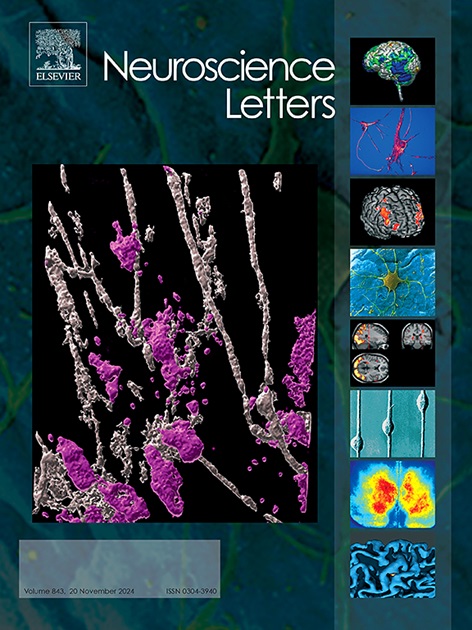脑AMPK信号通过脑促食欲素和迷走神经通路改善大鼠肠道屏障功能
IF 2
4区 医学
Q3 NEUROSCIENCES
引用次数: 0
摘要
漏肠是一种肠道通透性增加的现象,在许多疾病中都有描述。我们最近已经证明,大脑中的神经肽如食欲素可以改善肠道渗漏,这表明大脑参与维持肠道屏障功能。有人认为,下丘脑中的AMPK在食物摄入中起作用。由于下丘脑不仅参与摄食行为的调节,还参与肠道功能的调节,因此本研究旨在阐明大脑中AMPK调节肠道屏障功能的假设。通过定量测定大鼠结肠组织内吸收的埃文斯蓝来测定结肠通透性。内源性AICAR是一种AMPK激活剂,可以降低lps诱导的结肠高通透性,而外周给予AICAR则不能改变这种情况。腹腔内注射AICAR对结肠高通透性的改善被腹腔内注射阻断,而皮下注射复方C、AMPK抑制剂、阿托品或迷走神经切断对其没有阻断作用。内源性增氧素受体拮抗剂可阻断AICAR对结肠高通透性的改善,而催产素和GLP-1受体拮抗剂则不能。内胆化合物C可阻止脑催产素或GLP-1,但不能阻止食欲素诱导的结肠高通透性改善。这些结果表明,激活脑AMPK能够通过脑食欲素信号和迷走神经减少结肠高通透性。此外,大脑内源性AMPK可能介导催产素或glp诱导的结肠高通透性改善。我们认为,通过激活脑AMPK改善漏肠可能在漏肠相关疾病中发挥作用。本文章由计算机程序翻译,如有差异,请以英文原文为准。

Brain AMPK signaling improves intestinal barrier function through brain orexin and the vagal pathway in rats
Leaky gut, an increased intestinal permeability, has been described in many diseases. We have recently demonstrated that neuropeptides such as orexin in the brain improved leaky gut, suggesting that the brain is involved in maintaining intestinal barrier function. It has been suggested that AMPK in the hypothalamus play a role in food intake. Because the hypothalamus is involved in the regulation of not only feeding behavior but also gut function, the present study was performed to clarify a hypothesis that AMPK in the brain regulate gut barrier function. Colonic permeability was determined by quantifying the absorbed Evans blue within the colonic tissue in rats. Intracisternal AICAR, an AMPK activator, could reduce LPS-induced colonic hyperpermeability while peripherally administered AICAR failed to change it. The improvement of colonic hyperpermeability by intracisternal AICAR was blocked by intracisternal but not subcutaneous compound C, AMPK inhibitor, atropine or vagotomy. The improvement of colonic hyperpermeability by intracisternal AICAR was blocked by intracisternal orexin receptor antagonist but not oxytocin or GLP-1 receptor antagonist. Intracisternal compound C prevented brain oxytocin or GLP-1 but not orexin-induced improvement of colonic hyperpermeability. These results suggest that activation of brain AMPK is capable of reducing colonic hyperpermeability through brain orexin signaling and the vagus nerve. In addition, endogenous AMPK in the brain may mediate the oxytocin or GLP-induced improvement of colonic hyperpermeability. We would suggest that improvement of leaky gut by activation of brain AMPK may play a role in leaky gut-related diseases.
求助全文
通过发布文献求助,成功后即可免费获取论文全文。
去求助
来源期刊

Neuroscience Letters
医学-神经科学
CiteScore
5.20
自引率
0.00%
发文量
408
审稿时长
50 days
期刊介绍:
Neuroscience Letters is devoted to the rapid publication of short, high-quality papers of interest to the broad community of neuroscientists. Only papers which will make a significant addition to the literature in the field will be published. Papers in all areas of neuroscience - molecular, cellular, developmental, systems, behavioral and cognitive, as well as computational - will be considered for publication. Submission of laboratory investigations that shed light on disease mechanisms is encouraged. Special Issues, edited by Guest Editors to cover new and rapidly-moving areas, will include invited mini-reviews. Occasional mini-reviews in especially timely areas will be considered for publication, without invitation, outside of Special Issues; these un-solicited mini-reviews can be submitted without invitation but must be of very high quality. Clinical studies will also be published if they provide new information about organization or actions of the nervous system, or provide new insights into the neurobiology of disease. NSL does not publish case reports.
 求助内容:
求助内容: 应助结果提醒方式:
应助结果提醒方式:


